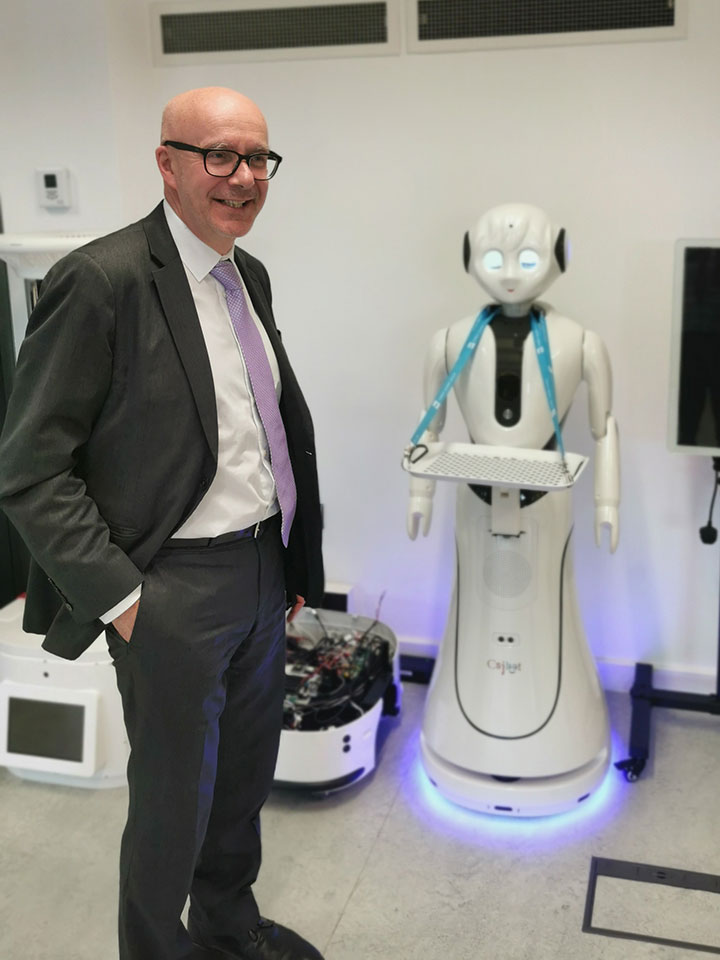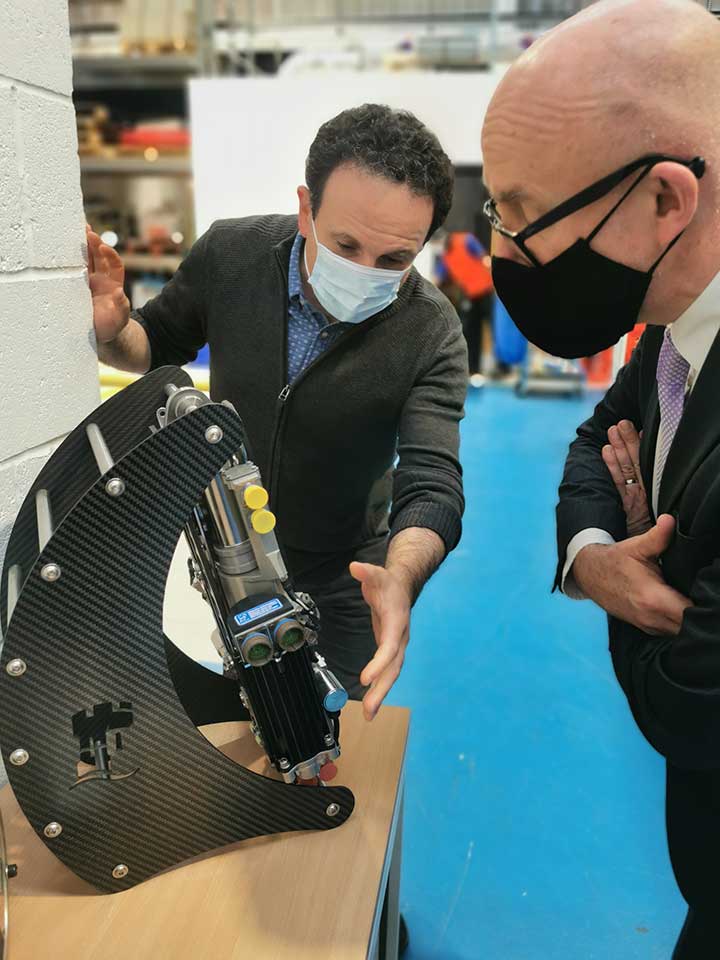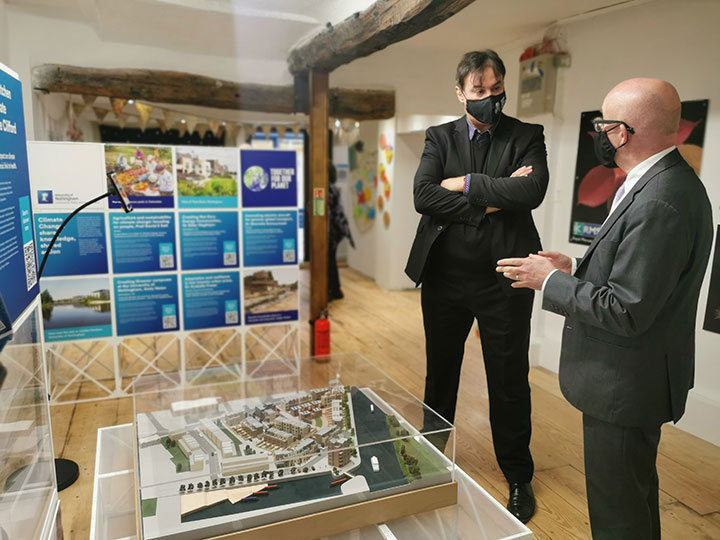Exciting new technologies that will shape the economy and drive sustainability on a regional, national and global scale have been showcased by The University of Nottingham during a visit by the Shadow Universities Minister.
Matt Western MP spent the morning of Thursday 18 November speaking to students and researchers on University Park and Jubilee campuses, before heading into the city centre for a tour of the new Green Light in the City sustainability pop up shop.
During his fact finding visit to the city, the Labour MP for Warwick and Leamington met Steve Benford, Professor of Computer Science, and Robin the Robot at the university's brand new Cobot Maker Space. The facility provides a dedicated space for research and industry collaboration into new innovations in robots and artificial intelligence (AI), and enhancing human-robot interaction in a range of real life scenarios - from business and manufacturing to home life with social and rehabilitation robots.

And he heard how University of Nottingham academic research and technical expertise are also at the forefront of the LEADD:NG Project, which is delivering a programme of innovation to support the local creative and cultural industries which were severely impacted by the restrictions imposed in response to the Covid 19 pandemic.
Pro-Vice-Chancellor Professor Jeremy Gregory underlined the importance of academic innovation and expertise in the university's civic engagement through initiatives such as Universities for Nottingham. The pioneering collaboration brings together the combined strength of Nottingham's two world-class universities to improve the way they work - with each other and local partners - to help change the lives of local people for the better.
We were absolutely delighted to welcome the Shadow Minister to our campuses in Nottingham. The visit was a golden opportunity to offer him a snapshot of some of our world-leading research and our ambitions for the future and to have fruitful conversations about the University's valuable contribution to the region's civic and economic priorities.

As chair of the All-Party Parliamentary Group on Electric Vehicles and Vice-Chair of the All-Party Parliamentary Group on Climate Change, Mr Western MP was keen to learn about how the university is driving change that will reduce carbon emissions and support the move towards a greener planet.
Professor Chris Gerada, Associate Pro-Vice-Chancellor for Industrial Strategy, Business Engagement and Impact, who headed up the university's delegation to COP26, led a tour of the Power Electronics and Machines Centre (PEMC), the purpose built new home for the Propulsion Futures research group, which is set to open formally in the new year and will sit at the heart of the university's priority research into net zero aviation.
Nottingham is Europe's leading research university in aviation – its Institute for Aerospace Technology alone brings together more than 350 scientists and engineers, creating, testing and demonstrating novel technologies in sector-leading facilities.

The new PEMC features an unrivalled 20 megawatt demonstration capacity, giving its £40m UK Electrification of Aerospace Propulsion Facility a world-leading capability for testing electric components and drive systems for short-medium range aircraft.
By March 2024, the university estimates that £140m worth of industrial work will align with the aerospace propulsion facility, strengthening the world's largest regional aviation supply-chain cluster and associated high-skilled jobs, and reinforcing the UK's and the East Midlands' reputation as the go-to place for the development of electrification technologies for future aerospace platforms.

The environmental theme was continued with the visit to Green Light in the City, the new Nottingham partnership to develop 'pop-up' spaces in empty retail premises which will provide a focus for creativity and engagement with key local issues. The partnership consists of a range of local creative, cultural and sustainability organisations as well as both universities and Nottingham City Council.
The project aims to raise awareness, promotion, and engagement with green issues and how they affect everyone individually and locally; to encourage community and creative partnerships to get involved; and create opportunities for workshops, events, and talks. To coincide with COP26, the United Nations' key Climate Change Conference held in Glasgow earlier this month, the first pop-up is focusing on climate change during November and December, with an emphasis on green issues, sustainability and helping Nottingham achieve its ambition to be carbon neutral by 2028.
The visit also offered the chance to learn more about the university's ambitious vision for net zero aviation through an exhibition on display at the shop and to chat with Mark Gillott, Professor of Sustainable Building Design, part of the university's COP26 delegation. He outlined researchers' involvement in the low-energy housing project Trent Basin, which is helping to regenerate the city on the banks of the River Trent, and the role that retro-fitting green technologies will play in helping to make existing housing stocks more sustainable for the future.
Our universities have a critical role to play in supporting the post-Covid recovery of communities up and down the country.
He added: "It was tremendously exciting to see first-hand the inspirational work taking place in Nottingham - from the success of the Universities for Nottingham initiative that is forging stronger civic partnerships to technologies of the future like Robin the robot and his friends at the Cobot Maker Space.
"It is these exciting developments that the government's decision to push back the date for Research & Development funding to be restored to 2.4% of GDP to 2027 puts at risk.
"I was also lucky enough to be shown around a pioneering new project in the city centre, called 'Green Light in the City,' showing how universities can reach out and build relationships with the communities they serve.
"Research, development and civic engagement are vital for embedding universities in their communities."






